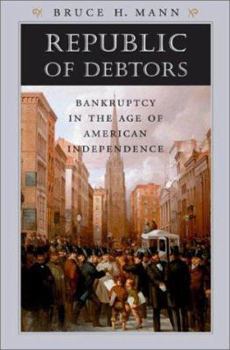Republic of Debtors: Bankruptcy in the Age of American Independence
Select Format
Select Condition 
Book Overview
Debt was an inescapable fact of life in early America. At the beginning of the eighteenth century, its sinfulness was preached by ministers and the right to imprison debtors was unquestioned. By 1800,... This description may be from another edition of this product.
Format:Hardcover
Language:English
ISBN:0674009029
ISBN13:9780674009028
Release Date:January 2003
Publisher:Harvard University Press
Length:344 Pages
Weight:1.45 lbs.
Dimensions:1.2" x 6.4" x 9.5"
Customer Reviews
2 ratings
Good overview in how bankruptcy is okay for elite
Published by Thriftbooks.com User , 18 years ago
Today the rich can still find ways to get out of the spendthrift debts with trusts, shelters, and bankruptcy, but we have to crack down on the debts that poor people get into like student loans, medical expenses, unemployment and the like. This book tells us that the elite in the U.S. have always been all in favor of getting out of their own debt while holding the lowborn to the "morality" of insolvency for life.
Compelling and Highly Pertinent
Published by Thriftbooks.com User , 21 years ago
Bankruptcy is in the air these days, from Enron to overextended former dot-commers. So-called "bankruptcy reform" -- intended to make bankruptcy more difficult and more punitive for debtors -- has been pushed by large creditors for years, and almost passed in the most recent session of Congress.I'm a first-semester law student. I came to this book with a solid, basic understanding of modern bankruptcy law (gained as a business person and as a legal assistant prior to starting law school). As an undergraduate I took two semesters of legal history, and I have an extensive personal interest in American history.Despite my background, until I read this book I had no real appreciation of the implications of failing to have an effective bankruptcy law. Focusing primarily on the second half of the eighteenth century (both before and after the American Revolution), Republic of Debtors does an amazing job of showing the social, humanitarian and economic consequences of failing to provide for an orderly discharge of debts in bankruptcy, especially when combined with creditors' remedies such as imprisonment for debt.I, for one, had never confronted the fact that imprisonment for debt survived so long after the American Revolution, nor did I realize that, aside from some brief experiments, the US did not adopt a set nationwide laws on bankruptcy until the late nineteenth century.Professor Mann tells the story by drawing on a wide variety of primary materials, including the diaries of imprisoned debtors and documentation of court cases. One particularly interesting chapter deals with the an elaborate form of self-government that evolved within one of the debtor's prisons. As many of those imprisoned were relatively well-educated and had been involved in the movement for independence from England, it was only natural that they would have their own constitution and elected government.Then, as now, there was a tension between the moral and economic aspects of bankruptcy. On one hand, debtors can be viewed immoral spendthrifts, on the other, as hapless victims of the vicissitudes of a world-wide economy or the bad actions of others. These same tensions underlie the current debate on changes to bankruptcy law, driven by creditors who are seeking a return to a more punitive, moralistic approach to dealing with insolvent creditors.I strongly recommend this book to anyone interested in the modern bankruptcy debate, early American legal history, or social and economic history generally. It is also just a cracking good read.Cheers!




